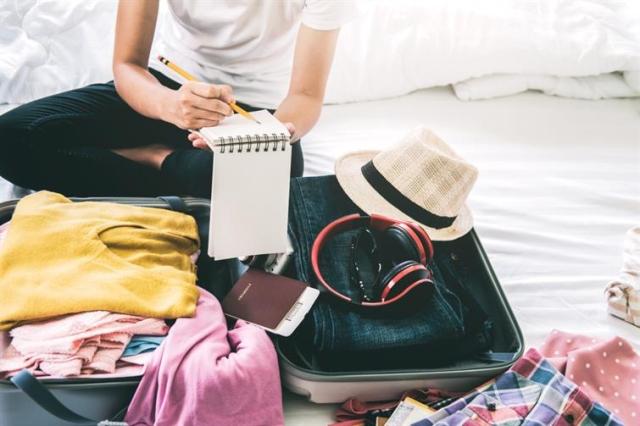It has been quite the year. Taking a safe and relaxing trip is practically a necessity at this point. Maybe you’re finally able to make that trip to see your family or out-of-town friends, maybe you’re traveling for work again, or you’re feeling comfortable enough to book that much-needed vacation. Whatever the reason for your trip, your rental property should be the last thing on your mind while you’re gone. Thanks to our guide on how to protect your apartment while you’re traveling, you can put your apartment safety concerns to rest. However, what steps should you take to prepare your home for a long absence? When you come back from your vacation, you want to ensure that you’re able to get back to your normal routine as quick as possible. Follow this timeline to make that happen.
- Find a house sitter
- Make arrangements for pets
- Notify your landlord
- Check your bills
- Odds and ends
- Clean
- Check the weather
Two Weeks Before Departure
Find a House Sitter
The first step in preparing your home for a long absence is finding a house sitter. You can have a trusted friend or family member house sit, or you can hire someone from a reputable site.
Booking a house sitter two weeks before you leave should be plenty of time, but if you’re going to be gone for more than a month, consider starting your search earlier to make sure everyone has enough time to prepare. A house sitter can be someone that stays at your rental while you’re gone, or it can be someone that just checks in while you’re away. Decide which type works best for you before you start looking. If you’re renting a large, single-family home or you’re going to be gone for an extended period of time (over two weeks), it may be best to have someone stay in your home.
Whether the house sitter is staying at your place or dropping in, make sure to leave them detailed and clear instructions. The instructions should include anything you expect them to do while you’re away. It can include things like how and when to water plants, cleaning instructions, and the garbage schedule. If the house sitter doubles as a pet sitter, leave another list with instructions on pet care.
In addition to the instructions list, leave an emergency contact note. This note should include a local emergency contact, a number for a handyman or your landlord, any codes you want to give them (garage door and alarm system), your vet’s number, and your contact information.
If you’re going to be gone for several months, consider finding someone to sublet your rental while you’re away. Check your lease and ask your landlord about the steps you need to take to sublet your place while you’re gone.
Make arrangements for pets
If your house sitter isn’t watching your pets, plan for animal care. Doing this two weeks or earlier is best. If you decide to take your pet to a boarding facility, they may need to pass a temperament test and get their shots updated before they can board. If you’re not boarding, give yourself plenty of time to arrange for a pet sitter. You can have a trusted friend or family member do this, or you can find a reputable pet sitter online.
No matter which option you choose, make sure your pet will have everything they need before you go. Double check food supply, medications, treats, or anything else they use on the day-to-day. Then, make sure you have your instruction list and emergency contacts ready to go.
One Week Before Departure
Notify your landlord
A week before your trip, notify your landlord. Tell them when you’re leaving and when you’re coming home. They don’t need to know any specific details about where you’re going and staying if that makes you feel uncomfortable. It may seem a bit invasive, but it’s good practice to let them know you’re gone. Many landlords have a clause in the lease stating that you must inform them of any long absences. The reason they include this is mainly for insurance purposes. Some insurance policies lapse if there is no one residing in the property for an extended period. Your landlord can figure out the insurance, but make sure they know you will be gone.
Notifying your landlord is also good for apartment safety. You can have an extra set of eyes on your home and car. If you have anyone coming to your apartment, let your landlord know this and give them the house/pet sitter’s information for emergencies. Finally, double-check with your landlord that your contact information and that of your emergency contact is up to date.
Check your bills
Looking at your bills in advance could save you from a major headache when you come home. Your landlord cannot demand rent earlier than the due date stated in the lease. That being said, make sure you have a way to pay rent if you plan to be gone during the rent due date. Set up automatic payments, pay rent early with a certified check, or pay your bill online while you’re away. If you choose to pay while you’re away, set a reminder so you don’t forget. Follow the same precautions with other bills like utilities, Wi-Fi, credit cards, etc.
You’ll want to think about renter’s insurance and smart devices while you’re about a week away from departure. Check that your renter’s insurance plan is currently active and up to date. For extra apartment safety, think about investing in smart devices like bulbs, plugs, app-controlled cameras, and apartment locks you can control from your phone while away.
The Day Before Departure
Clean your apartment
Get some of your pre-vacation jitters out by cleaning your apartment the night before you leave. You want to walk into a clean and cozy home when you get back, so use the day before to pick up around your apartment.
Go through the fridge and get rid of anything that will spoil while you’re away. Wash your laundry, fold, and put away clothes. Run the dishwasher and put away the dishes. Run the garbage disposal to make sure nothing is in the drain. Change your bedsheets. Dust, vacuum, mop, wipe off counters, and anything else to make your space feel fresh and clean.
Check the weather
Weather predictions will be a bit skewed so far out in advance, but check in and prepare for the season. Take note if there are any predictions of inclement weather. If you’re expecting a storm, ask your landlord to check on the property to ensure everything is okay.
Prepare for the weather by setting the HVAC unit to the energy preferred setting. If you’re expecting freezing weather, consider opening the cabinets and letting the faucet drip to avoid bursting pipes. Avoid mold and heat damage during the summer by keeping the air conditioning at the energy preferred setting and leave ceiling fans running.
The Day of Departure
Finally, the long wait is over; it’s the day of your trip! Before you hop in the car or head to the airport, do a few quick things to finish preparing your home for vacation.
Keeping in mind season and weather predictions, adjust your thermostat, and do last-minute house prep according to the season. Save on your utility bill and unplug devices and electronics that don’t need to be in use. Do a final apartment safety check; lock all apartment doors and windows, close individual doors inside, make sure all appliances are off, turn off lights, and blow out candles. Lastly, make your bed and throw out the trash.
The final thing you need to do is lock your front door and have a great trip!






